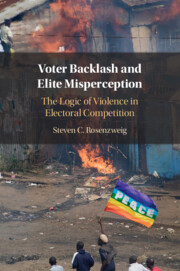Book contents
- Frontmatter
- Dedication
- Contents
- Figures
- Tables
- Preface
- Acknowledgements
- 1 Introduction
- 2 Election-Related Violence in Kenya and around the World
- 3 Theorizing Election-Related Violence: Toward a Theory of Elite Misperception
- 4 Violence and Election Outcomes
- 5 How Violence Affects Voting: Coercion, Persuasion, and Backlash
- 6 Elite Misperception and Election-Related Violence
- 7 Voter Backlash, Elite Misperception, and Violence beyond Kenya
- 8 Conclusion
- Appendix A Sampling Strategy for the Survey in Nakuru, Kisumu, and Narok
- Appendix B Supplementary Analyses
- Appendix C Candidate Vignettes and Outcome Questions
- Appendix D Politician Information Experiment Memo and Contact Scripts
- References
- Index
7 - Voter Backlash, Elite Misperception, and Violence beyond Kenya
Published online by Cambridge University Press: 18 May 2023
- Frontmatter
- Dedication
- Contents
- Figures
- Tables
- Preface
- Acknowledgements
- 1 Introduction
- 2 Election-Related Violence in Kenya and around the World
- 3 Theorizing Election-Related Violence: Toward a Theory of Elite Misperception
- 4 Violence and Election Outcomes
- 5 How Violence Affects Voting: Coercion, Persuasion, and Backlash
- 6 Elite Misperception and Election-Related Violence
- 7 Voter Backlash, Elite Misperception, and Violence beyond Kenya
- 8 Conclusion
- Appendix A Sampling Strategy for the Survey in Nakuru, Kisumu, and Narok
- Appendix B Supplementary Analyses
- Appendix C Candidate Vignettes and Outcome Questions
- Appendix D Politician Information Experiment Memo and Contact Scripts
- References
- Index
Summary
This chapter explores whether and how the findings from Kenya travel elsewhere around the world, analyzing cross-national quantitative analyses and case studies of a diverse group of countries with historically varying levels of violence, including Indonesia, Pakistan, Ghana, Nigeria, and Brazil. The analyses show how the causes and consequences of election-related violence identified in Kenya can help explain violence (or its absence) in other competitive electoral contexts as well. The cross-national quantitative analysis demonstrates the key role that the conduct of founding elections – in particular, the tactics used by the founding election winner – appears to play in whether or not violence becomes commonly employed by parties and candidates in the electoral cycles that follow. The case studies reveal little to no evidence that violence is effective in helping parties and candidates win office but do identify instances in which it may have resulted in voter backlash. In addition to identifying key structural conditions that make violence a more viable option in some cases than others, the analysis finds evidence consistent with the idea that the conduct of founding elections plays an important role in shaping politicians beliefs and expectations about the effects of violence on their electoral prospects.
Keywords
- Type
- Chapter
- Information
- Voter Backlash and Elite MisperceptionThe Logic of Violence in Electoral Competition, pp. 130 - 155Publisher: Cambridge University PressPrint publication year: 2023

